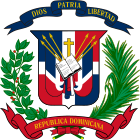The Liberal Party of Cuba, was one of the major political parties in Cuba from 1910 until the Cuban Revolution in the late 1950s, when it was exiled.

The Costa Rican Renewal Party is a Christian political party in Costa Rica.
The Social Democratic Institutional Bloc is a political party in the Dominican Republic.
The People's Democratic Party is a minor political party in the Dominican Republic. It first contested national elections in 1974, when it provided the main opposition to the ruling Reformist Party due to the Dominican Revolutionary Party not contesting the elections. Its candidate, Luis Homero Lajara Burgos, received 15% of the vote in the presidential election, whilst the party won three seats in the House of Representatives. In 1978 many of the opposition parties returned to the electoral scene. Lajara Burgos received only 0.4% of the vote in the presidential election, whilst the party lost all three seats in the House of Representatives after a similar result in the Congressional elections.

Parliamentary elections were held in the Dominican Republic on 16 May 2002. The result was a victory for the opposition Dominican Revolutionary Party-led alliance, which won 73 of the 150 seats in the House of Representatives. Voter turnout was 51.0%.

General elections were held in the Dominican Republic on 15 March 1924. Horacio Vásquez of the Progressive National Alliance won the presidential election, whilst his party also won the parliamentary elections and the Constitutional Assembly election.

General elections were held in the Dominican Republic on 16 May 1934. Two years earlier, the Dominican Party of President Rafael Trujillo had been declared the only legally permitted party. However, the country had effectively been a one-party state since Trujillo assumed office in 1930.

General elections were held in the Dominican Republic on 16 May 1938. At the time, the country was a single-party state, with the Dominican Party as the only legally permitted party.

General elections were held in the Dominican Republic on 16 May 1942. Rafael Trujillo, who had previously served as president from 1930 to 1938, was the sole presidential candidate and was returned to office unopposed. He had remained the country's de facto leader even after leaving office for the first time. His Dominican Party won every seat in the Congressional elections.

General elections were held in the Dominican Republic on 16 May 1947. For the first time since the 1924 elections, and the only time during the three-decade rule of Rafael Trujillo, there was still more than one presidential candidate by election day. However, incumbent president Trujillo was re-elected after receiving 93% of the vote. His Dominican Party won every seat in the Congressional elections, as it had at every election since its founding.

General elections were held in the Dominican Republic on 16 May 1952.

General elections were held in the Dominican Republic on 16 May 1957. Incumbent Héctor Trujillo was the only candidate in the presidential election, and was unopposed for a second term. However, his predecessor and brother Rafael Trujillo, the country's de facto leader since 1930, maintained absolute control of the country. The Dominican Party won every seat in the Congressional elections.

General elections were held in the Dominican Republic on 20 December 1962. They were the first after the end of the Rafael Trujillo dictatorship two years earlier, as well as the first with no military candidates for president since 1938. They are generally regarded to be the first free elections in the country's history.

General elections were held in the Dominican Republic on 16 May 1970. The main opposition party, the Dominican Revolutionary Party, did not contest the elections, leaving only the ruling Reformist Party and some right-wing and centre-right parties. Incumbent Joaquín Balaguer won the presidential election, whilst his Reformist Party won the Congressional elections. Voter turnout was 63%.

General elections were held in the Dominican Republic on 16 May 1974. The main opposition party, the Dominican Revolutionary Party, did not contest the election, leaving only the ruling Reformist Party and some right-wing and centre-right parties. Incumbent Joaquín Balaguer won the presidential election, whilst his Reformist Party won the Congressional elections in alliance with the National Youth Movement. Voter turnout was 71.7%.

General elections were held in the Dominican Republic on 16 May 1978. Following diplomatic pressure from American President Jimmy Carter, the elections were free and competitive and contested by all political parties, unlike the previous elections in the 1970s. Antonio Guzmán Fernández won the presidential election, whilst his Dominican Revolutionary Party won the Congressional elections. Voter turnout was 76%.

General elections were held in the Dominican Republic on 16 May 1990. Following a long vote count, Joaquín Balaguer of the Social Christian Reformist Party (PSRC) was declared winner of the presidential election, whilst in the Congressional elections the PSRC received the most votes and won a majority in the Senate, although the Dominican Liberation Party won the most seats in the House of Representatives.

General elections were held in the Dominican Republic on 16 May 1994. Joaquín Balaguer of the Social Christian Reformist Party won the presidential election, whilst the Dominican Revolutionary Party-led alliance won the Congressional elections. Voter turnout was 87.6%.

Presidential elections were held in the Dominican Republic on 16 May 1996, with a second round on 30 June. Whilst José Francisco Peña Gómez won the most votes in the first round, he was defeated by Leonel Fernández in the second round, after the Social Christian Reformist Party, whose candidate had lost in the first round, declared their support for Fernández. Voter turnout was 78.63% in the first round and 76.80% in the second.

Parliamentary elections were held in the Dominican Republic on 16 May 1998. The result was a victory for the opposition Dominican Revolutionary Party-led alliance, which won 83 of the 149 seats in the House of Representatives. Voter turnout was 52.9%.

















